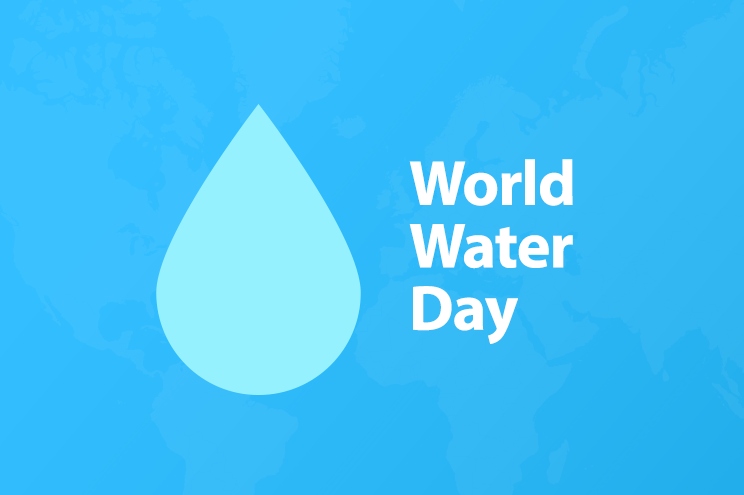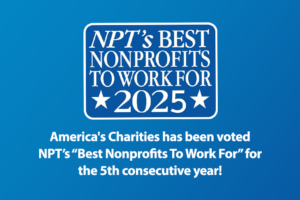America's Charities | February 20, 2024
World Water Day March 22, 2024
Addressing water scarcity and the need for sanitation and access to clean water globally (UN SDG #6)
771 million (1 in 10) people do not have access to safe water. Furthermore, about 4 billion people, representing nearly two-thirds of the world population, experience severe water scarcity during at least one month of the year. The United Nations has reported that “Water use has been growing globally at more than twice the rate of population increase in the last century, and an increasing number of regions are reaching the limit at which water services can be sustainably delivered, especially in arid regions.” If nothing changes, intense water scarcity could displace 700 million people by 2030.
Gaining a better understanding of how water impacts economic, political, and social stability around the globe and knowing how to solve these problems is vital to addressing the growing water and sanitation crisis.
Why It Matters:
Water is essential not only to health, but also to poverty reduction, food security, peace and human rights, ecosystems and education. Below are a handful of facts and statistics about how sanitation and access to clean water impact people and communities around the world.
Health and Hygiene
- Hygiene promotion is the most cost effective health intervention. (World Bank 2016)
- 700 children die every day from diseases linked to unsafe water, sanitation and hygiene. (WHO/UNICEF 2021)
- 1 in 3 healthcare facilities does not have access to hand hygiene where care is provided.Almost 2 billion people depend on health care facilities without basic water services.
- Timely hand hygiene prevents up to 50 per cent of avoidable infections acquired during health care delivery, including those affecting the health workforce.
(WHO/UNICEF 2021) - Over the past five years, half a billion people have gained access to basic hand hygiene facilities – a rate of 300,000 per day. (WHO/UNICEF 2021)
Education
- Women and girls are responsible for water collection in 8 out of 10 households with water off premises, which means reducing the population with limited drinking water services will have a strong gender impact. (WHO and UNICEF, 2017)
- 43% of schools around the world lack access to basic handwashing with soap and water (WHO)
- 1 in 3 schools worldwide have either limited drinking water or no drinking water at all (WHO)
Environment
- People living in poverty are especially vulnerable to the impact of climate change because of their reliance on unstable water and sanitation systems, weaker institutional protections, and limited access to funding.
- Climate change affects water and sanitation, and water and sanitation services contribute to climate change because of the use of energy.
- Increasing access to sanitation and improved wastewater management can help reduce greenhouse gas emissions.
- The potential risks to water and sanitation services posed by climate change include damage to infrastructure, leading to the loss of services and to deterioration in water quality – impacts that will increase risks to health.
- Floods and other water-related disasters account for 70 per cent of all deaths related to natural disasters (UN)
Economic
- Improving household water and sanitation access impacts household finances and ultimately the economy at a macro level. (Water.org)
- Universal access to basic water and sanitation would result in $18.5 billion in economic benefits each year from avoided deaths alone. (Water.org)
- Every $1 invested in water and sanitation provides a $4 economic return from lower health costs, more productivity and fewer premature deaths. (Water.org)
Be Part of the Solution:
Solving the global water crisis will require cross-sector collaboration. If individual donors, businesses, and the government work together to provide necessary support, there’s no reason anyone should suffer the health and economic consequences listed above. America’s Charities members are committed to addressing issues like the water crisis, and you can empower children and families all around the world by supporting these organizations.
In honor of #WorldWaterDay, March 22 every year, America’s Charities is celebrating the following agents of change who we are proud to call our members.
You can support their work through workplace giving, matching gift campaigns, and other social responsibility programs. Click below to learn more about each organization.
- Feed the Children: Clean water and sanitation intervention for children and their families is crucial to prevent common illness. When children are guaranteed proper health and sanitation measures, they are able to prevent and fight disease, which enables them to develop both physically and mentally into strong children who become contributing members of their communities. Feed the Children’s programs promote healthy immune systems and enable children to develop through adolescence and into adulthood. Learn more.
- The Conservation Fund: The Conservation Fund strives to protect our nation’s water resources by finding positive, lasting solutions to conserve it. They use strategic land conservation to protect properties vital to the water supply, whether it’s a plot that holds a community’s drinking supply, an urban area prone to flooding, or regions whose waters are threatened by development. In addition, The Conservation Fund helps cities and communities find ways to manage their water sustainably and effectively. Learn more.
How to Join Us for World Water Day 2022:
-
Follow us on Twitter and Facebook as we share how our members’ specific programs are working to address water scarcity and bring clean water to communities around the world.
- Donate & raise money for these nonprofits. America’s Charities is proud of the work our member charities do in these respective areas. One of the most cost-efficient ways you can support these nonprofits is to donate to them via payroll deduction through your employer’s workplace giving program (Don’t have a program? Click here to have your employer contact our team.) Click on each charity’s name above to learn more about their work, and to make a donation now!

Get Resources and Insights Straight To Your Inbox
Explore More Articles
For Fifth Consecutive Year America’s Charities Named ‘Best Nonprofit To Work For’
Washington, D.C. – April 1, 2025 – America’s Charities, the nonprofit that mobilizes the power of giving as a leading provider of volunteering, workplace giving,…
Read ArticleWorkplace Fundraising + Volunteering Summit (April 2nd and 3rd, 2025)
Join us in attending this virtual summit! The America’s Charities team is joining up with other leading voices in the workplace giving space for a…
Read ArticleThe Time to Act is Now
The results of the 2024 National Assessment of Educational Progress (NAEP) are in, and the findings are, in a word, heartbreaking. This assessment serves as…
Read ArticleGet Resources and Insights Straight To Your Inbox
Receive our monthly/bi-monthly newsletter filled with information about causes, nonprofit impact, and topics important for corporate social responsibility and employee engagement professionals, including disaster response, workplace giving, matching gifts, employee assistance funds, volunteering, scholarship award program management, grantmaking, and other philanthropic initiatives.




